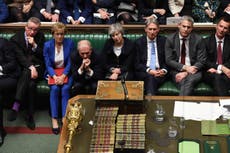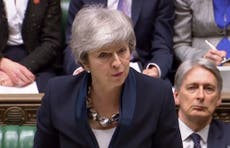Corbyn's referendum pledge has made Brexit a Tory gift to the nation – but the result is as hard to call as ever
The Labour leadership might think going for a second vote won't cost the party much, and they could be right
Politics seized up after Theresa May's Brexit deal suffered its historic defeat in January. Since that moment, despite appearances perhaps, Brexit went a little bit quiet.
The prime minister made the impossible promise to her hard-Brexit backbenchers to unpick and renegotiate the Irish backstop. And she has spent the best part of a month shuttling back and forth between London, Dublin and Brussels in a fruitless quest to do so, all the while winding the clock down to Brexit day.
Then politics sped up again. Last Monday saw the longest trailed launch of a new formation in British political history finally take place. The “new politics” of the Independent Group (TIG) looked suspiciously like the pre-2015 old politics, but their common reference point was dissatisfaction with the main parties' approaches to Brexit.
For the former Tories it was May's persistent wilting to her party's right flank. For the former Labourites, the refusal to back a second referendum on Brexit was key. Now Labour has kicked away the TIG’s main prop by coming out for a Final Say vote – in line with conference policy, it has to be said.
Whether it was because of pressure exerted by Tom Watson and Keir Starmer, as widely reported over the weekend, or because sections of the leadership were spooked by the resignations and the TIG’s good showing in the polls oes not really matter. Equally, the party might have calculated it could afford to change tack to head off further defections simply because getting second referendum legislation through the Commons is still very difficult.
Still, they could not have known what was going to happen on Tuesday afternoon. May's Commons speech has moved the goalposts somewhat. On 12 March MPs will vote on her deal again, perhaps with amendments tacked on like John Mann's on post-Brexit workers' rights. Should it be defeated, there will follow a vote on a no-deal Brexit the next day, and a vote on extending Article 50 the day after, assuming MPs do indeed rule out no deal.
There is a possibility that the more pragmatic wing of the Tory Brexiteers could unite with Labour rebels who want to see Brexit through and support the prime minister in that first vote. Under these circumstances would Remain-inclined Conservatives, including those on the payroll, rebel? Perhaps they will go along with May's deal, although if past behaviour is the best indicator of future behaviour, they will not.
Supposing the votes stack up so parliament seeks and is granted an extension of Article 50. May's deal would undoubtedly make another zombie-like return. However, for as long as it remains a possibility, the inbuilt majority against a second referendum is still there, even if the majority of Labour MPs vote for it. The only situation in which it stands a chance is if it goes up against a stark choice between a referendum and a no-deal Brexit.
Let us put that aside and suppose another referendum clears the Commons. What would the likely result be? Of course, that depends very much on the question. The people's vote campaign has long argued for the retention of Remain on any ballot paper.
The problem there is that if a vote is between no deal, May's deal, and staying in then the winning choice may well get fewer than 50 per cent of ballots cast, raising serious legitimacy issues. Likewise, if it's no deal versus May's deal, or May's deal versus Remain, then there are going to be a lot of unhappy people whichever way the question breaks.
There are also issues around what the politics of each campaign should be. Last time the Remain campaign was overly negative and allowed itself to be painted as a campaign of the elite, yet most of the same people – including some involved with The Independent Group – head up the “continuity Remain” organisations. In the age of populist politics, of us versus them, would it be wise to let them stay in charge?
As for Leave, depending on the question, some permutation of a betrayal narrative is bound to feature in their campaigning. The possible consequences of this sort of thing do not need to be spelled out.
The Labour leadership might think going for a second referendum will not cost the party much, and they could be right. With Brexit approaching we can see the consequences in terms of relocations, closures, and economic uncertainty. For Leave-voting Labour supporters, more traditional concerns around jobs, housing and insecurity could be pushing any attachment to a nearly three-year-old referendum vote down the list of priorities.
Also, by taking this position, Brexit is now explicitly a Tory Brexit. All the problems and the fall out now sit with the prime minister and her party, which would play to Labour's strengths in the long run. After all, younger people tend to be more pro-EU and they're growing as a cohort.
There is also a possibility that by Labour becoming the de facto Remain party, the Tories become the de facto Leave party. After all, in 2017 the Conservative result – their highest vote since 1992 – was largely thanks to May positioning them as the “Brexit means Brexit” party. Nevertheless, it is also worth noting Nigel Farage's claims that he would boycott a second poll. Whether this is said in good faith or not, a second referendum could drive large numbers of Leave voters into outright abstention when it comes to this and future elections, which itself would alter the political complexion of the country.
All told, Labour's move is significant. It could be the making of a Jeremy Corbyn premiership, or spell ruin for his chances. What is for sure, and whatever happens, the long political slog of Brexit still has a punishing distance left to run.
Phil Burton-Cartledge is a blogger and a lecturer in Sociology at the University of Derby






Join our commenting forum
Join thought-provoking conversations, follow other Independent readers and see their replies